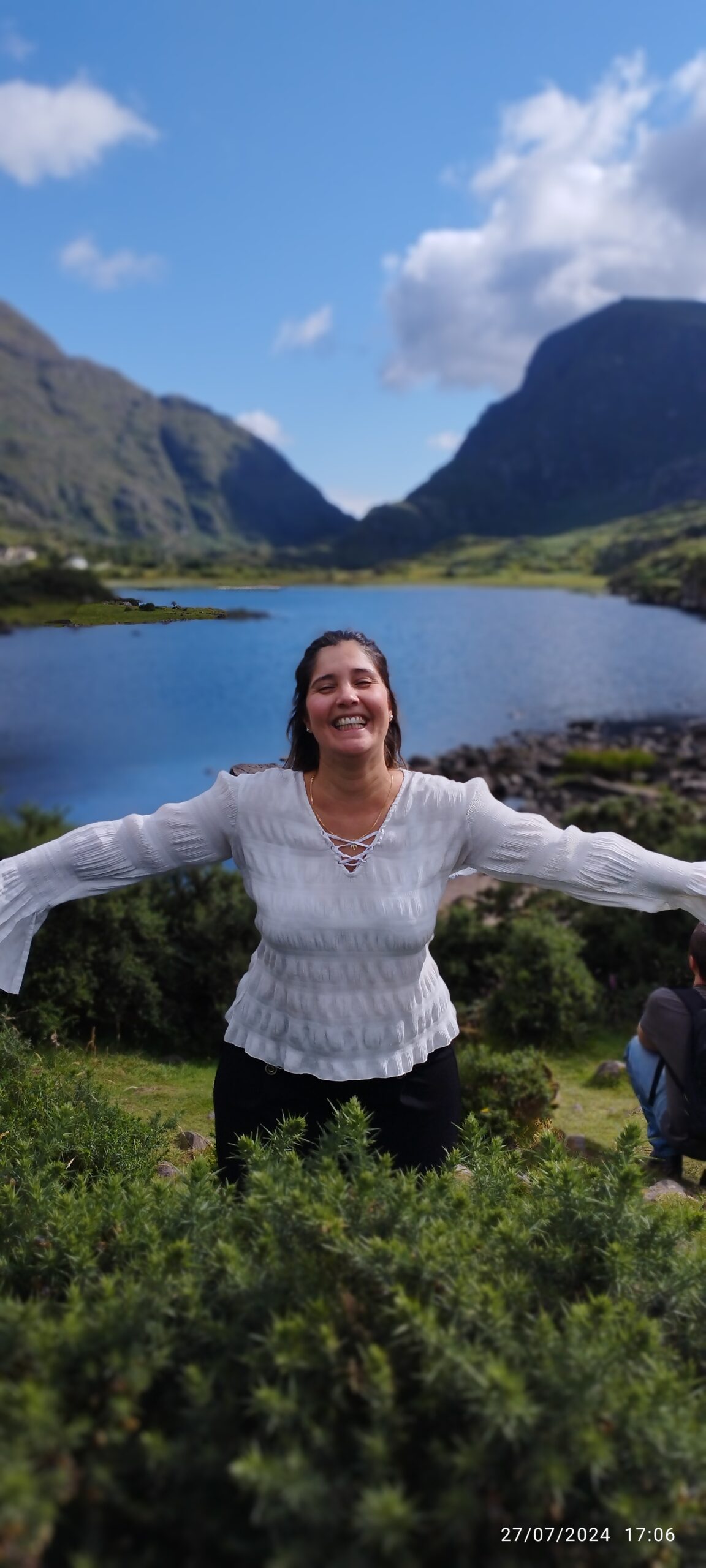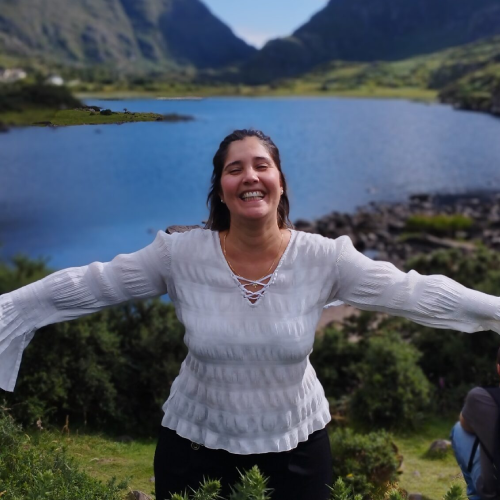

Deborah Mulas is a 36-year-old student who relocated a few years ago from Cagliari in Sardinia, to Ireland, where she attends the University of Limerick. This is where she had her first experience with virtual exchange.
Deborah managed to get some of her qualifications from her cultural heritage course at the University in Cagliari recognised in the UK. Currently she’s doing a Bachelor degree in Sociology and History. This was the pathway that most closely resembles what she was studying in Italy.
Recently Deborah undertook the CliVEx project as an integral part of a course entitled ‘Broadening across Cultures’, under the guidance of Marta Giralt.
“Before I began this bachelor,’ explains Deborah, ‘I had to make some time to improve my English. My education in Italy was interrupted at various times. I worked in a restaurant first, then again I stopped because I had a child. Then Covid struck and what with one thing and another, I wasn’t able to complete my studies. So here I am at 36 – a mature student at Limerick and I’m loving it and determined to finish my degree now.
Passions and pathways
Cultural Heritage is my passion and I love to study these things, but the CliVEx experience and climate change VE – well, that was something totally new to me and not a topic I knew a great deal about. That was the attraction I suppose.
Deborah says she has always been interested in interacting with people from different parts of the world.
“The international aspect of this virtual exchange really attracted me and it also met my needs. I think this topic is very pertinent right now. It’s something I wanted to deepen my knowledge of and I realised how very little I knew once the virtual exchange began. Doing it really helped me to identify fake news and misinformation which are things that we are all vulnerable to. It exceeded my expectations in every way and took me out of my comfort zone.”
Teamwork and collaboration
“For the virtual exchange, we worked in groups of 4,’ she explains. ‘We arranged our appointments with the other students and worked both collaboratively also alone to do our research and find out more. Our work included synchronous and asynchronous tasks. My time was also constrained for various reasons, as I have a family and I also have a job. That said, I had a very nice group including a student from Pakistan, one Dutch and one Palestinian too. So really lovely and diverse and this diversity meant we all had different viewpoints which ensured the collaboration was very enriching.
Climate change is something we all feel and experience differently. The Palestinian girl’s experience really struck me profoundly and in fact, she and I are still in touch after this experience.
Hers was an impactful and traumatic viewpoint and it was emotional for me to listen to her. You realise how lucky you are not to be living their experience which is exacerbated by war. War means that in spite of the need, climate change is not a priority for them. She was amazing at expressing herself. She works in health care and she is vegan and very aware. But she was also experiencing the war, so I felt really moved by her and her perspective and what she is living through.“
Virtual exchange and peer-to-peer learning
“The other students were all younger than me and yet I learned so much from them. We talked about other things beside the Palestinian perspective. So, this was an added bonus as she already openly shared so much with us. She told us how difficult it is to address climate change at home as there are more serious and immediate issues to address.
I think we all realised that when we speak to our parents, they don’t really listen. All of us are guilty of underestimating the impact of climate change. That was the thing we found to be the same for all of us and over which we bonded. The Dutch student told us about how they manage their flood risk in the Netherlands and I realised how far ahead they are compared to Italy for example.
But, he too spoke about politics in Holland and how corrupt things are. The student from Pakistan was actually a student the University of Padua and he showed us how to save water through a project he was doing there.”
The issue of language in VE
“Language was a bit of an issue during the exchange as none of us is English mother tongue. For this reason, we all had to try really hard to deepen our conversations. And this was a good thing.
To help overcome our shyness, our tutor used icebreakers to help us not be nervous about our English. We chatted about food and hobbies and music to break the ice a bit.
I’m lucky as I’m not a very shy person anyway, but this experience really helped me feel more confident about my English. I must say, it made me feel old compared to the other students who were all in their 20s and who were more agile in speaking and translating.
Another difference that struck me was cultural and the various ways in which we expressed ourselves. I noticed the Palestinian student was more shy and more reserved and I realised how much I gesticulate – I’m Italian so that’s how we are!
I learned how cultural differences are important to notice and to learn about too. Not all groups bonded in the same way ours did. We had a lovely time together and I really enjoyed it. Not only, but we also managed to finish and present our work at the end. We really wanted to finish and do well.“
Life experience and its impact in VE
“We didn’t have serious disagreements or conflicts in our group. Although I think these moments serve a purpose too. I can’t say we always agreed, but we managed to find a way through.
We all have life experiences and we talked about these differences. And we talked a lot about and social media, which I don’t really use and they do!
We discussed the impact of misinformation spread on social media too. My son, who is 14, wants to access social media platforms that I disagree with and so I talked about this in our sessions. I learned from the other younger students. They told me that kids will see stuff anyway, as they will find a way to access information elsewhere. This is something I learned, from them. So, I speak to my son about this and explain the risks to him the risks. I think they understood about my concerns and learned from me too.
It was a good exchange really and we all learned from each other.”
Takeaways from international online learning
“I learned about small things we can do at home for climate change. For example, eating less meat. But I’m Italian and moreover I’m Sardinian and we love meat! So this isn’t easy to navigate for me. But, I involve my family in small changes that can make a difference. And my family in Italy too.
I have taken the VE out of the university walls and into my life which is exactly what we were supposed to do.
I’d do it all again as it was very positive. I’d collaborate with students of any age and I’d explore other topics. There is always something to learn.
I’d advise everyone to have a go despite the age. Virtual exchange opens up the mind and you learn to accept differences and to explore these. It’s high time to listen and learn from each other I believe.“
